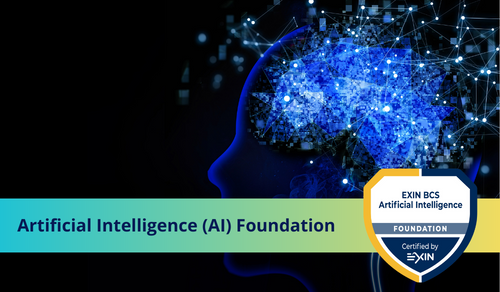Description
Neem de volgende stap in het ontwikkelen van uw kennis en begrip van Artificial Intelligence met deze training. Leer de algemene principes van AI, de potentiële implicaties en mogelijkheden ervan en hoe je AI-producten en -diensten vanuit meerdere invalshoeken kunt beoordelen. Voorbeelden van AI zijn de laatste tijd veel in het nieuws geweest, het begon met chatbots zoals Google Assistant en nu ChatGPT. Natuurlijk is AI veel meer dan alleen chatbots, toch gaan we hier ook op in om de do’s en don’t hiervan te leren.
Deze 3-daagse training behandelt de potentiële voordelen; soorten Artificial Intelligence (AI); het basisproces van Machine Learning (ML); de uitdagingen en risico’s van een AI-project en de toekomst van AI en People at Work.
Doelstellingen:
– Beschrijf hoe Artificial Intelligence (AI) deel uitmaakt van ‘Universal Design’ en ‘De Vierde Industriële Revolutie’.
– Toon begrip van de Artificial Intelligence (AI) Intelligente Agent Beschrijving
– De voordelen van Artificial Intelligence (AI) uitleggen
– Beschrijf hoe we leren van Data – Functionaliteit, Software en Hardware
– Laat zien dat Artificial Intelligence (AI) (in het bijzonder Machine Learning (ML)) mensen en machines zal aanzetten om samen te werken.
– Beschrijf een ‘Learning from Experience’ Agile Approach van projecten
Voor wie:
Het Artificial Intelligence Foundation certificaat is gericht op personen met een interesse in (of behoefte aan) AI in een organisatie, met name degenen die werkzaam zijn op gebieden als wetenschap, techniek, kennistechnologie, financiën of IT-diensten.
De volgende jobrollen komen veelal in aanmerking;
– Engineers
– Scientists
– Professional research managers
– Chief technical officers
– Chief information officers
– Organizational change practitioners and managers
– Business change practitioners and managers
– Service architects and managers
– Program and planning managers
– Service provider portfolio strategists / leads
– Process architects and managers
– Business strategists and consultants
– Web page developers
Inhoud:
1 Ethical and Sustainable Human and Artificial Intelligence (AI)
1.1 Recall the General Definition of Human and Artificial Intelligence (AI)
The candidate can…
1.1.1 describe the concept of intelligent agents.
1.1.2 describe a modern approach to Human logical levels of thinking using Robert Dilt’s Model.
1.2 Describe what are Ethics and Trustworthy Artificial Intelligence (AI), in Particular:
The candidate can…
1.2.1 recall the general definition of Ethics.
1.2.2 recall that a Human Centric Ethical Purpose respects fundamental rights, principles and values.
1.2.3 recall that Ethical Purpose AI is delivered using Trustworthy Artificial Intelligence (AI) that is technically robust.
1.2.4 recall that the Human Centric Ethical Purpose Trustworthy Artificial Intelligence (AI) is continually assessed and monitored.
1.3 Describe the Three Fundamental Areas of Sustainability and the United Nation’s Seventeen Sustainability Goals
1.4 Describe how Artificial Intelligence (AI) is Part of ‘Universal Design,’ and ‘The Fourth Industrial Revolution’
1.5 Understand that Machine Learning (ML) is a Significant Contribution to the Growth of Artificial Intelligence (AI)
The candidate can…
1.5.1 describe ‘learning from experience’ and how it relates to Machine Learning (ML) (Tom Mitchell’s explicit definition).
2 Artificial Intelligence (AI) and Robotics
2.1 Demonstrate Understanding of the Artificial Intelligence (AI) Intelligent Agent Description, and:
The candidate can…
2.1.1 list the four rational agent dependencies.
2.1.2 describe agents in terms of performance measure, environment, actuators and sensors.
2.1.3 describe four types of agent: reflex, model-based reflex, goal-based and utility-based.
2.1.4 identify the relationship of Artificial Intelligence (AI) agents with Machine Learning (ML).
2.2 Describe what a Robot is and:
The candidate can…
2.2.1 describe robotic paradigms
2.3 Describe what an Intelligent Robot is and:
The candidate can…
2.3.1 relate intelligent robotics to intelligent agents.
3 Applying the Benefits of Artificial Intelligence (AI) – Challenges and Risks
3.1 Describe how Sustainability Relates to Human-Centric Ethical Artificial Intelligence (AI) and how our Values will Drive our use of Artificial Intelligence (AI) and will Change Humans, Society and Organizations
3.2 Explain the Benefits of Artificial Intelligence (AI) by:
The candidate can…
3.2.1 list advantages of machine and human and machine systems.
3.3 Describe the Challenges of Artificial Intelligence (AI), and:
The candidate can…
3.3.1 give examples of general ethical challenges Artificial Intelligence (AI) raises.
3.3.2 give general examples of the limitations of Artificial Intelligence (AI) systems compared to human systems.
3.4 Demonstrate Understanding of the Risks of Artificial Intelligence (AI) Projects, and:
The candidate can…
3.4.1 give at least one a general example of the risks of Artificial Intelligence (AI).
3.4.2 describe a typical Artificial Intelligence (AI) project team in particular.
3.4.3 describe a domain expert.
3.4.4 describe what is ‘fit-of-purpose’.
3.4.5 describe the difference between waterfall and agile projects.
3.5 List Opportunities for Artificial Intelligence (AI)
3.6 Identify a Typical Funding Source for Artificial Intelligence (AI) Projects and Relate to the NASA Technology Readiness Levels (TRLs)
4 Starting Artificial Intelligence (AI): how to Build a Machine Learning (ML) Toolbox – Theory and Practice
4.1 Describe how we Learn from Data – Functionality, Software and Hardware
The candidate can…
4.1.1 list common open source machine learning functionality, software and hardware.
4.1.2 describe introductory theory of Machine Learning (ML).
4.1.3 describe typical tasks in the preparation of data.
4.1.4 describe typical types of Machine Learning (ML) Algorithms.
4.1.5 describe the typical methods of visualizing data.
4.2 Recall which Typical, Narrow Artificial Intelligence (AI) Capability is Useful in Machine Learning (ML) and Artificial Intelligence (AI) Agents’ Functionality
5 The Management, Roles and Responsibilities of Humans and Machines
5.1 Demonstrate an Understanding that Artificial Intelligence (AI) (in Particular, Machine Learning (ML)) will Drive Humans and Machines to Work Together
5.2 List Future Directions of Humans and Machines Working Together
5.3 Describe a ‘Learning from Experience’ Agile Approach to Projects
The candidate can…
5.3.1 describe the type of team members needed for an Agile project.
Inclusief examen:
EXIN BCS Artificial Intelligence Foundation exam
Datum:
Wanneer u op onderstaande link klikt zult u de beschikbare data te zien krijgen.
Bij bestelling kunt u de gewenste trainingsdata aangeven in het notitieveld.
Kalender Artificial Intelligence Foundation 2026
Duur:
3 dagen
Deze training is ook beschikbaar als:
– Maatwerktraining, neem hiervoor contact op met een van onze opleidingsadviseurs.
Voor veelgestelde vragen tijdens het bestelproces, bekijk onze F.A.Q. pagina.









